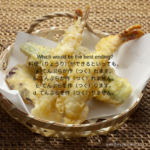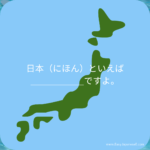
Today’s Question
You saw a menu item きょうのおばんざい. You’ve never seen/heard the word おばんざい, so you want to know what that means.
You asked きょうのおばんざいはなんですか。
Will you get an answer you are after?
Today’s Grammar Point:
- ~というのは…(のこと)だ
- ~とは・・・(のこと)だ
- ~って(いうのは)…(のこと)だ
Connection
Both ~ and … take a [noun] or a [noun phrase]
Meaning
~ means ・・・
Note
This expression is used to explain the meaning of ~.
Examples
- 普通電車というのはどの駅にも止まる電車のことです。
What is called “ordinary train” is a train which stops at every station. - 日本語のスーパーって、たいていスーパーマーケットのことだよ。
“Super” in Japanese usually means a supermarket! - コンビニとはコンビニエンスストアのことだ。
“Konbini” means a convenience store. - 良い音楽というのは人を揺さぶる音楽のことだ。
Good music is a music that jolts people. - 終電とはその夜最後の電車のことです。
“Shuuden” means the last train for the night. - 危篤というのは、病気やケガがとても重くて、死ぬかもしれないということです。
“kitoku” means that the illness or injury is so bad that the person may die. - 面会謝絶とはビジターは病室に入れないということです。
“menkaishazetsu” means no visitors are allowed in the hospital room. - 「おばんざい」って何ですか。 – おばんざいは京都の言葉でお惣菜のことです。
What does “obanzai” mean? – “Obanzai” is a Kyoto dialect and means a side-dish prepared in advance.
cf. きょうのおばんざいは何ですか。- 「ひじきのたいたん」*です。
What is today’s special menu? – It’s ”boiled hijiki (= a kind of seaweed).”*
* Of course whatever comes inside the quotation mark will be different each day.
Answer to Today’s Question:
As is shown above, if you ask きょうのおばんざいはなんですか, the answer you’ll get is the name of the side-dish for the day.
If you skip きょうの and ask just おばんざいはなんですか, probably a waiting person will pause a moment and come back with a counter question:
- If he/she doesn’t think you know the word おばんざい, he/she may say: おばんざいのいみですか。(Are you talking about the meaning of おばんざい?)
- If he/she thinks you know the meaning of おばんざい already (like when the question is asked in a Kyoto dialect), he/she may ask きょうの おばんざい(の こと)ですか。(Are you talking about Today’s Obanzai?)
If you want to know the meaning of a certain word (xxx), you should always ask:
- xxxって何(のこと)ですか。
- xxxとは何(のこと)ですか。
- xxxというのは何(のこと)ですか。
Of course, you can ask 「xxxは英語で何ですか。」(=what is xxx in English?) if the other person knows English.
If you liked this post, please share it with your friends via your social media accounts. Your support will be appreciated!
Related posts
~というほどではない

~という…

If you liked this post, please share it with your friends via your social media accounts. Your support will be appreciated!







